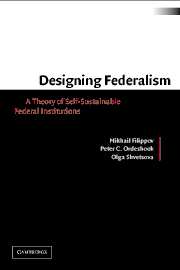Book contents
- Frontmatter
- Contents
- List of Figures
- List of Tables
- Preface
- Acknowledgments
- 1 Federations and the Theoretical Problem
- 2 Federal Bargaining
- 3 Two Cases of Uninstitutionalized Bargaining
- 4 Representation
- 5 Incentives
- 6 Political Parties in a Federal State
- 7 Institutional Sources of Federal Stability I
- 8 Institutional Sources of Federal Stability II
- 9 Designing Federalism
- References
- Name Index
- Subject Index
8 - Institutional Sources of Federal Stability II
Published online by Cambridge University Press: 03 December 2009
- Frontmatter
- Contents
- List of Figures
- List of Tables
- Preface
- Acknowledgments
- 1 Federations and the Theoretical Problem
- 2 Federal Bargaining
- 3 Two Cases of Uninstitutionalized Bargaining
- 4 Representation
- 5 Incentives
- 6 Political Parties in a Federal State
- 7 Institutional Sources of Federal Stability I
- 8 Institutional Sources of Federal Stability II
- 9 Designing Federalism
- References
- Name Index
- Subject Index
Summary
In all governments, whatever their form, however they may be constituted, there must be a power established from which there is no appeal, and which is therefore called absolute, supreme, and uncontrollable. The only question is where that power is to be lodged.
James Wilson, Pennsylvania Ratifying Convention, 1787If a confederation should take place, one great question is how shall we vote? Whether each colony shall count one? Or whether each shall have a weight in proportion to its numbers, or wealth, or exports or imports, or a compound ratio of all? Another is whether Congress shall have the authority to limit the dimensions of each colony, to prevent those which claim, by charter or proclamation, or commission to the south sea [the Pacific Ocean] from growing too great and powerful, so as to be dangerous to the rest?
John Adams, 1776The general adoption of the popular, state-wide voting procedure [for president] gave a popular dimension to the presidential contest, created or enhanced the need for state party machinery, weakened the political authority of legislative caucuses, occasioned the development of national party conventions, and made the presidential election the dramatic focal point of American politics.
McCormick 1966: 29Wilson was quick to supply the answer to his question concerning the ultimate source of state power: “[I]t remains and flourishes with the people.”
- Type
- Chapter
- Information
- Designing FederalismA Theory of Self-Sustainable Federal Institutions, pp. 259 - 298Publisher: Cambridge University PressPrint publication year: 2004



